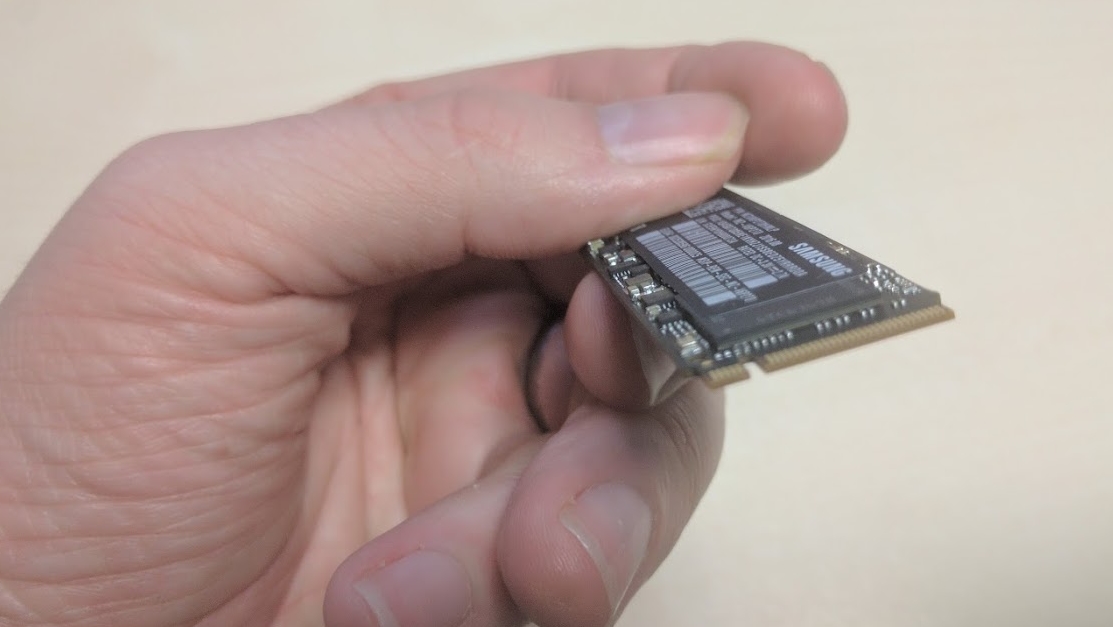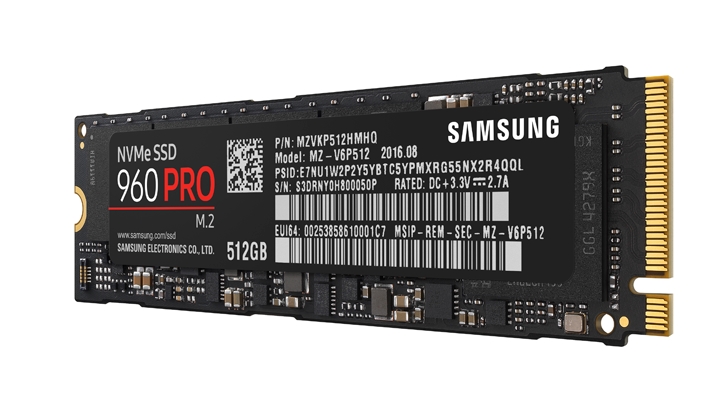TechRadar Verdict
One of the fastest SSDs in the world. This is an amazing drive, but its price may put it out of reach for many people.
Pros
- +
Incredibly fast
- +
Reliable
- +
5 year warranty
- +
No SATA bottleneck
- +
Large capacity
Cons
- -
Incredibly expensive
- -
Not all users will benefit from these speeds
Why you can trust TechRadar
Forget exploding smartphones and overpriced TVs, there’s an area where the Samsung brand means best-in-class: storage. The South Korean giant is back with the Samsung NVMe SSD 960 Pro M.2 SSD, a drive that it promises delivers ‘next generation professional performance and endurance'.
We got our hands on the version with a whopping 2TB of storage, which means not only does this drive provide incredibly fast speeds, but it also comes with enough space for plenty of applications, files and games – if you’re that way inclined.
Of course, the combination of the latest technology, high speeds, massive capacity and the Samsung brand should set a few alarm bells ringing when it comes to anticipating the price. This is not a budget drive at all, in fact at $1299.99 (around £1065, AU$1710) for the 2TB version, this is an SSD that costs more than most PCs of laptops. It also comes in 512GB and 1TB capacities, and while they are cheaper ($329.99 and $629.99 respectively), these are still pricey drives that are aimed squarely at professionals and enthusiasts. So is the high price worth it? Read on to find out.

Features and specification
The Samsung NVMe SSD 960 Pro M.2 is unlike regular SSDs which use the SATA III port on your motherboard – instead it uses the M.2 port, which most modern motherboards in desktop PCs and laptops have. This allows it to avoid the bottleneck of the ageing SATA connection, which was mainly designed with traditional mechanical hard drives in mind.
While most regular SSDs top out at around 520MB/s write, 560MB/s read speeds, the Samsung NVMe SSD 960 Pro M.2 is capable of a fantastic 2,100MB/s write 3,500MB/s read speeds, according to Samsung. That is a huge speed boost, and one that if you have the money to afford the Samsung NVMe SSD 960 Pro M.2, will really make an impact on your day-to-day computing.

Samsung is able to cram this much performance, as well as a huge amount of drive space, into such a small stick thanks to its 48-layer V-NAND-based architecture.
This is a drive that’s also built to last, with the 1TB model of the Samsung NVMe SSD 960 Pro M.2 having a guaranteed lifespan of at least 800TB, while the 2TB is even longer at 1.2PB (which is 1200TB). It has a mean time between failures (MTBF) of 1.5 million hours, while a warranty of 5 years also backs up the drive. Power consumption is low at around 5.8 watts when idle.
Sign up to the TechRadar Pro newsletter to get all the top news, opinion, features and guidance your business needs to succeed!
Trim and S.M.A.R.T support are included, as well as AES 256-bit encryption. Basically, this hard drive claims to be pretty much everything you wished for in a hard drive, but does it live up to the hype?
Performance
So does the Samsung NVMe SSD 960 Pro M.2 live up to the hype and justify the performance? Yes. In our ATTO benchmark scores, the hard drive scored an incredible 2074.863MB/s write, 3421.242MB/s read. This is one seriously fast SSD.
The CrystalDiskMark also produced fantastic results, with 3480MB/s read, 2100MB/s write. With this drive we can begin talking about GB/s speeds, rather than MB/s.
To put this in perspective, the Adata SSD Ultimate SU800 managed 562MB/s read and 515MB/s write. We were impressed with those scores, but in light of the Samsung NVMe SSD 960 Pro M.2's performance, even that seems a little slow. Of course there are a few things to bear in mind here: first, the Adata SSD Ultimate SU800 still uses the SATA III connection, so its performance is bottlenecked. Secondly, its also a heck of a lot cheaper than the Samsung NVMe SSD 960 Pro M.2.
In our real world tests we copied over a 3.5GB file in just 38 seconds. If your job requires you to move large amounts of data around, then the Samsung NVMe SSD 960 Pro M.2 is definitely worth considering, and can justify its price tag in the long run.

Matt is TechRadar's Managing Editor for Core Tech, looking after computing and mobile technology. Having written for a number of publications such as PC Plus, PC Format, T3 and Linux Format, there's no aspect of technology that Matt isn't passionate about, especially computing and PC gaming. He’s personally reviewed and used most of the laptops in our best laptops guide - and since joining TechRadar in 2014, he's reviewed over 250 laptops and computing accessories personally.
